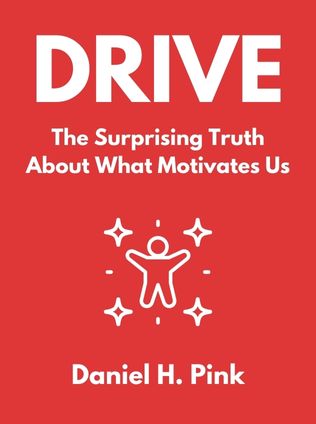
Drive
The Surprising Truth About What Motivates Us
By Daniel H. Pink
Published 04/2011
About the Author
Daniel H. Pink is a best-selling author known for his thought-provoking books on business and work. His notable works include A Whole New Mind, The Adventures of Johnny Bunko, and Free Agent Nation. Pink has also contributed to prestigious publications such as The New York Times, Harvard Business Review, Fast Company, and Wired. His insights on motivation and work dynamics have made significant impacts in the field of business and beyond.
Main Idea
In Drive, Daniel H. Pink challenges the traditional carrot-and-stick approach to motivation and presents a new framework based on the latest scientific research. He introduces the concept of intrinsic motivation, which is driven by autonomy, mastery, and purpose. Pink argues that these intrinsic factors are more effective in fostering motivation and engagement in the workplace than extrinsic rewards.
Table of Contents
- Introduction: A Better Choice Than Carrots and Sticks
- The New Rules of Motivation
- The Rise of Intrinsic Motivation
- Autonomy
- Mastery
- Purpose
- The Science Behind Motivation
- Harry Harlow's Monkey Puzzles
- Edward Deci's Discovery
- When Do Carrots Work?
- Implementing Intrinsic Motivation in the Workplace
- Creating Autonomy
- Fostering Mastery
- Connecting with Purpose
- Conclusion: A New Way Forward
Introduction: A Better Choice Than Carrots and Sticks
Daniel Pink begins by critiquing the outdated carrot-and-stick approach to motivation, which relies on rewards and punishments to drive behavior. He argues that this method is not only ineffective but can also be counterproductive. Pink presents a compelling case for a new understanding of motivation, one that recognizes the power of intrinsic factors like autonomy, mastery, and purpose.
Sign up for FREE and get access to 1,400+ books summaries.
You May Also Like
The Subtle Art of Not Giving a F*ck
A Counterintuitive Approach to Living a Good Life
By Mark MansonRich Dad Poor Dad
What the Rich Teach Their Kids About Money - That the Poor and Middle Class Do Not!
By Robert T. KiyosakiHow To Win Friends and Influence People
The All-Time Classic Manual Of People Skills
By Dale CarnegieFreakonomics
A Rogue Economist Explores the Hidden Side of Everything
By Steven D. Levitt and Stephen J. Dubner



















